Home | Category: Philosophy
ANCIENT GREEK PHILOSOPHY AND PHILOSOPHERS
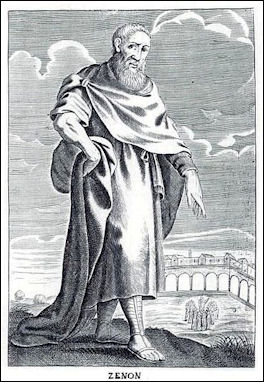
Zeno of Citium in Thomas
Stanley's History of Philosophy The ancient Greeks believed that a philosophy of life is critical for human flourishing. Without a guiding ethos, they feared, individuals are likely to lead unstructured and unproductive lives, to pursue superficial pleasures and to feel that their lives lack purpose. [Source: Sandra Woien, Arizona State University, The Conversation, January 2, 2024]
Philosophy is said to have been the beginning of reason , with the assumption being that before then people didn’t question things, they simply accepted them as seemed to be the case in ancient Egypt, where things changed little in 3000 years. Philosophy was like religion in that it attempted to explain things that were difficult to explain but rather than relying on doctrines and set beliefs to explain them it used reasoning the scientific thought to sort them out. For the Greeks, it was also a mental exercise the same way working in the gymnasium was physical exercise. [Sources: The “Seekers” by Daniel Boorstin]
Philosophy is said is to have began in ancient Greece. The primary forces behind its founding were curiosity and a desire to understand the universe and explain things that happened around them. The Greece philosophers were as much scientists and as philosophers. They often devoted as much attention to describing phenomena in the natural world as they did exploring human issues such as fate and mankind’s purpose.
Websites on Ancient Greece: Internet Encyclopedia of Philosophy iep.utm.edu;Stanford Encyclopedia of Philosophy plato.stanford.edu; Internet Ancient History Sourcebook: Greece sourcebooks.fordham.edu ; Hellenistic World sourcebooks.fordham.edu ; Lives and Social Culture of Ancient Greece Maryville University online.maryville.edu ; Perseus Project - Tufts University; perseus.tufts.edu ; ; Gutenberg.org gutenberg.org; Illustrated Greek History, Dr. Janice Siegel, Hampden–Sydney College hsc.edu/drjclassics ; Cambridge Classics External Gateway to Humanities Resources web.archive.org/web; Ancient Greek Sites on the Web from Medea showgate.com/medea ; Greek History Course from Reed web.archive.org; Classics FAQ MIT classics.mit.edu
RECOMMENDED BOOKS:
“Ancient Greek Philosophers” by Editors of Canterbury Classics (2018) Amazon.com;
“Greek Philosophy: Thales to Aristotle (Readings in the History of Philosophy) by Reginald E. Allen (1991) Amazon.com;
“The Greek Philosophers: From Thales to Aristotle” by William K. Guthrie (1960) Amazon.com;
"Readings in Ancient Greek Philosophy: From Thales to Aristotle” by S. Marc Cohen, Patricia Curd, et al. (2016) Amazon.com;
“Greek Thought: A Guide to Classical Knowledge” by Jacques Brunschwig and Geoffrey E.R. Lloyd (Harvard University Press) Amazon.com;
“The Seekers” by Daniel Boorstin (1998) Amazon.com;
"The Shape of Ancient Thought: Comparative Studies in Greek and Indian Philosophies"
by Thomas McEvilley (2001) Amazon.com;
“The Greeks and the Irrational” by E. R. Dodds (1951) Amazon.com;
“Lives and Opinions of Eminent Philosophers” by Diogenes Laërtius (1739) Amazon.com;
“Ancient Philosophy, Mystery, and Magic: Empedocles and Pythagorean Tradition”
by Peter Kingsley (1997) Amazon.com;
“The Metaphysics of the Pythagorean Theorem: Thales, Pythagoras, Engineering, Diagrams, and the Construction of the Cosmos out of Right Triangles” by Robert Hahn (2018) Amazon.com;
“Hellenistic Philosophy: Stoics, Epicureans, Sceptics” by A. A. A. Long Amazon.com;
"Athletics and Philosophy in the Ancient World" by Heather Reid (2012)
Amazon.com;
Early Ancient Greek Philosophers
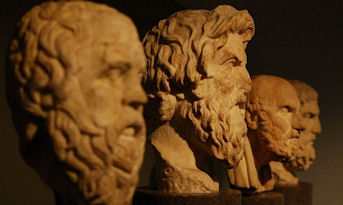 Early philosophers of the Archaic Age such as Thales of Miletus (624-546? B.C.) and Herakleitos (540?-475 “) began investigating things like the nature of the universe, the origin of life and the nature of life. Among other things, Thales believed that all things developed from water not the gods. Herakleitos argued that change was the guiding force in the universe and permanence was impossible.
Early philosophers of the Archaic Age such as Thales of Miletus (624-546? B.C.) and Herakleitos (540?-475 “) began investigating things like the nature of the universe, the origin of life and the nature of life. Among other things, Thales believed that all things developed from water not the gods. Herakleitos argued that change was the guiding force in the universe and permanence was impossible.
Parmenides (5th century B.C.) and Zeno of Elea (5th century B.C.) , sometimes considered the founding fathers of philosophy, were the first people to be recorded as questioning the nature of being. Parmenides had the opposite view as Herakleitos. He argued that permanence was the guiding force in the universe and change was impossible. Some scholars have suggested that Zeno of Elea was gay.
RELATED ARTICLES:
EARLY GREEK PHILOSOPHY, COSMOLOGY AND SCIENCE europe.factsanddetails.com ;
EARLY ANCIENT GREEK PHILOSOPHER-SCIENTISTS europe.factsanddetails.com ;
ELEATIC SCHOOL OF PHILOSOPHY: PARMENIDES, XENOPHANES, ZENO AND MELISSUS europe.factsanddetails.com
Pythagoreans and Pythagoras
Pythagoras of Samos (sixth century B.C.) is said to have been the first man to call himself a philosopher and is credited with coining the word philosophy. None of his original writings survive. According to legend he fled the Aegean island of Samos as a youth to escape from an evil tyrant. After being exposed to new ideas in Egypt and Asia Minor he established a school in the Italian colony of Kroton in 530 B.C. After being persecuted and forced to flee again he settled in Metapontum, Greece, where he died around 500 B.C.
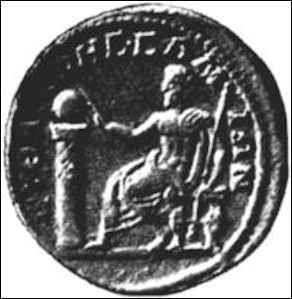
Pythagoras Pythagoras was one of the first people to become a vegetarian for health and philosophical reasons. He ate bread and honey for his meals, with vegetables for desert, and he even abstained from eating eggs and beans. He didn’t eat meat because he believed that animals had souls. His belief about beans had nothing to do with farts. Instead it based on the belief that beans were the first offspring of the Earth.
The Pythagoreans were followers of Pythagoras. Headquartered first on the island of Samos and later Croton in southern Italy, they were the first to make the profound discovery that all aspects of nature — musical notes, mathematics, science, architecture and engineering — followed rules that were determined by the relationship between numbers.
The Pythagoreans were like an ascetic religious cult. They believed in reincarnation and conducted purification rituals that attempted to erase wrongs committed in past lives. They were required to follow many rules. They had to be vegetarians. They couldn’t drink wine and were required to observe periods of silence. Their purification rituals were conducted with great secrecy.
See Separate Articles:
PYTHAGORAS: LIFE, LEGENDS AND ODDITIES europe.factsanddetails.com
PYTHAGOREANSAND THEIR STRANGE BELIEFS AND RULES factsanddetails.com
PYTHAGOREANS, MATH, MUSIC AND GEOMETRY europe.factsanddetails.com
Golden Age of Philosophy
The Golden Age of Philosophy extended roughly from 430 B.C. to 320 B.C., corresponding with the lives of Socrates, Plato and Aristotle. Although Plato was a pupil of Socrates and Aristotle was a pupil of Plato all three philosophers made very different contributions to philosophy. Great schools of philosophy included Plato's Academy and Aristotle’s Lyceum. These and other schools were often connected to gymnasiums and some early students were athletes who listened to lectures between training sessions. There were also groups like the Sophists, Cynics, and Stoics.
RELATED ARTICLES:
PLATO: HIS LIFE, ACADEMY AND DEATH europe.factsanddetails.com ;
PLATO’S PHILOSOPHY AND VIEWS ON ETHICS, SCIENCE AND LOVE europe.factsanddetails.com ;
PLATO'S MAIN WORKS — THE REPUBLIC, CAVE AND IMMORTAL SOUL — AND THE MAIN IDEAS IN THEM europe.factsanddetails.com ;
PLATO’S ACCOUNTS OF SOCRATES, HIS TRIAL AND DEATH AND THE SOCRATIC METHOD europe.factsanddetails.com
ATLANTIS: PLATO, LEGENDS AND THE SEACH FOR IT europe.factsanddetails.com
ARISTOTLE: HIS LIFE, WORKS AND LEGACY europe.factsanddetails.com ;
ARISTOTLE’S PHILOSOPHY AND CONTRIBUTIONS TO SCIENCE europe.factsanddetails.com ;
ARISTOTLE ON WOMEN, FAMILIES, SLAVERY AND EDUCATION europe.factsanddetails.com ;
POETICS: ARISTOTLE ON POETRY, PLOTS, IMITATION, COMEDY AND TRAGEDY europe.factsanddetails.com
ARISTOTLE ON GOVERNMENT AND POLITICS europe.factsanddetails.com
Sophists
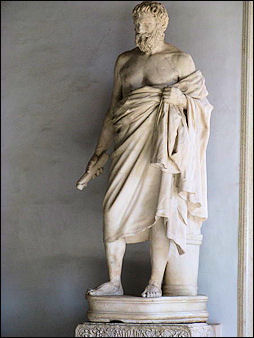 The Sophists were a group of anti-philosophers. Protagoras (480?-411 B.C.), their founder, believed that the human mind was incapable of fathoming the truth and said that all view points could be argued and people were better off spending their time doing civic duties and helping others. His famous motto was: “Man is the measure of all things.”
The Sophists were a group of anti-philosophers. Protagoras (480?-411 B.C.), their founder, believed that the human mind was incapable of fathoming the truth and said that all view points could be argued and people were better off spending their time doing civic duties and helping others. His famous motto was: “Man is the measure of all things.”
Rising to prominence in the 5th century B.C., Sophists were traveling teachers who taught mainly in sports gymnasiums. They opposed philosophical speculation. Instead they taught rhetoric in Dale Carnegie-style positive thinking and getting-ahead-in-life classes. These practical philosophers believed thought and action were intrinsically linked and persuasion was the most effective means of getting what one wanted. The Sophists gave us the word sophism, meaning a clever but specious.
The Sophists had a special speech-making school for generals and statesman. Protagoras taught his students many useful tips including never let "vowels fall in adjacent positions, for this would create a halting effect, nor is it right to end one word and begin the next with same syllable." The leader's most famous speech, “ Panegyric,” took nearly 15 years to compose. [Source: "The Creators" by Daniel Boorstin,μ]
RELATED ARTICLES:
ANCIENT GREEK PHILOSOPHY: HISTORY, PHILOSOPHERS, MAJOR SCHOOLS europe.factsanddetails.com ;
SOPHISTS europe.factsanddetails.com ;
SOCRATES' LIFE, CHARACTER, STUDENTS AND PLATO europe.factsanddetails.com ;
SOCRATES AT A SYMPOSIA europe.factsanddetails.com ;
SOCRATES'S PHILOSOPHIES, IDEAS, DISCUSSIONS AND THE SOCRATIC METHOD europe.factsanddetails.com
SOCRATES' TRIAL, DEFENSE AND DEATH Europe. factsanddetails.com
Cynics and Diogenes
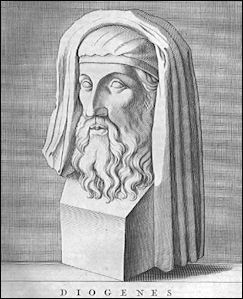
Diogenes of Sinope The Cynics were created after the death of Socrates in 339 B.C. They were like hippies. They dressed is shabby clothes, begged for spare change and taunted sports fans when they left the stadiums. They even went as far as urinating and shitting in public as a kind of performance art. They gave us the words cynical and cynics
The Cynics were founded by Antisthenes (445- 360 B.C.). They stressed the private individual's search for happiness, satisfaction of animal gratification and turned up their noses to social convention and material possessions.
Diogenes (372-287 B.C.) is the philosopher most associated with the Cynics. The son of a Crimean banker who was exiled to Greece for his involvement a counterfeiting scandal, he was captured by pirates and sold into slavery. Before he was sold he said his only skill was governing men and that he should sold to someone who wanted to learn such a skill.
Diogenes ended up teaching children in Corinth, where he became so famous that Alexander the Great once came to visit. When Alexander asked if he could do anything for Diogenes, the philosophers said, yeah, Alexander could stop standing between him and the sun.
Diogenes was a great admirer of Socrates and was known as an eccentric. He believed that wisdom could be obtained by giving up material possession expect a cloak and a wooden bowl. He used to sleep in a cask and a tub. Once he was spotted walking through the streets in the daytime holding a lantern. When he was asked why, he said, “I am seeking an honest man.”
See Separate Articles: CYNICS europe.factsanddetails.com DIOGENES europe.factsanddetails.com
Stoics, Skeptics and Epicureans
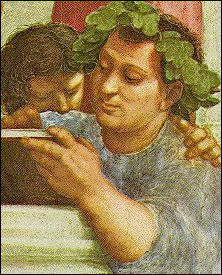
Epicurus by Raphael Zeno of Citium (335-263 B.C.) and the Stoics exalted reason, identified it with reason, and counseled an ascetic disregard for misfortune. Zeno "preached that wise men should remain indifferent to the vanities of the transient world." The Stoics gave us the word stoic, meaning: enduring pain or hardship without showing feelings or complaining.
Epicurus (342?-270 B.C.) proposed that the world is infinite and there are other worlds. The Epicureans regarded reality as a random arrangement of atoms and maintained that pleasure was the primary guiding force in life The Epicurean tried to build lives around the attainment of moderate pleasure without political or emotional involvement. The Epicureans gave us the word epicurean, meaning: devoted to the pursuit of sensual pleasure, especially to the enjoyment of good food and comfort.↕
The Skeptics — a group that in its extreme forms avoided all activity and human contact by going into the desert — argued it was impossible to be sure about anything.
RELATED ARTICLES:
EPICUREANISM: THE SWERVE, METAPHYSICS, EPISTEMOLOGY europe.factsanddetails.com
EPICURUS: LIFE, PHILOSOPHY, MAXIMS europe.factsanddetails.com ;
STOIC PHILOSOPHY europe.factsanddetails.com ;
STOIC PHILOSOPHERS europe.factsanddetails.com ;
SKEPTICS europe.factsanddetails.com
Ancient Greek Philosophy and Christianity
Philosophers showed an increasing concern with religion during the first centuries of the Christian era. Some combined Greek Philosophy with Oriental religious mysticism, The Neoplatonists created religious philosophies based on Plato’s teachings. A prominent Neoplatonist was Plotinus (A.D. 205? -270), whose views were used to combat the doctrines of Christianity.
The greatest early Christian thinker was St. Augustine (354-430) who philosophy drew heavily on Platonic concepts.
As Christianity became distanced from its Jewish roots it began to incorporate elements of other cultures and ways of thinking. It was especially influenced by Greek philosophy and Roman concepts of organization. Christianity also influenced other institutions. Roman paganism was influenced by Christianity and Christian hermits.
Theology according to historian Daniel Boorstein was "a Western creation nurtured in Hellenist Alexandria" and was "both a producer and a by-product of Christianity." Whereas the myth of the Gods and philosophy were separated under the Greeks. They were united in theology as Moses was made into a philosopher as well religious leader.
Philo of Alexandria (late first century B.C. to first century A.D.) is considered the father of theology. A rich Jewish nobleman, who was regarded a quite a fun-loving guy, he was one of the first to scrutinize Jewish-Christian doctrine using Platonic philosophical reasoning.
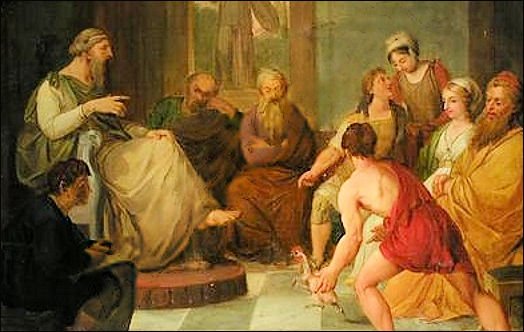
Diogenes brings a plucked chicken to Plato
Another influential thinker was Origen (185?-254), an Alexandrian Greek who castrated himself to ensure his purity and became head of the leading Christ theological academy at the age of 18. He is credited with giving Christianity some analytical credibility by incorporating elements of Greek philosophy but was unsuccessful making it hold up to the scrutiny of history.
Alexandria was a center of Christian and Jewish learning as well Greek learning. One of the greatest achievements of the Alexandria Library and learning center was The creation of the Old Testament by seventy-two Jewish scholars, brought together by Ptolemy, to translate the Hebrew Bible (the Torah), "which from its beginning was enshrouded in legend and folklore," into Greek. According to a Jewish legend, Ptolemy asked each of the Jewish scholars to individually to translate the whole Hebrew bible, and miraculously, the result, was 72 identical versions. Modern copies of the Bible are all based on the Greek translation.
Gnostics, St. Augustine and Greek Philosophy
Gnostics were Christian mystics who emerged between around A.D. 100 in Egypt and christianized a pagan sun festival around A.D. 120-140. Influenced by Plato and other Greek philosophers, they viewed things in dualistic terms such as between the goodness of the spirit and the evil of the earth and between a real world and false world. Gnosticism may have originally been a Christian adaption of the Greek philosophy. “ Gnosis” is the Greek word for knowledge. Much of what we know about the Gnostics comes from the Nag Hammadi manuscripts.
St. Augustine’s efforts helped clarify many divisive doctrinal issues and helped define what the Christian church is today. His account of his early life in his “Confessions” is widely regarded as classic biography of the conversion experience. In addition to the contributions he made to religion Augustine has also been called the first great psychologist, the father of the autobiography and pioneer of using literature to analyze himself and to explore self consciousness. His philosophy drew heavily on Platonic concepts.
Thomas Aquinas accepted Christian doctrines as beyond dispute but also studied and translated the ancient Greek philosophers, particularly Plato and Aristotle, and set about harmonizing their ideas with Christianity.
See Separate Articles: GNOSTICS: THEIR HISTORY AND IMPACT ON CHRISTIANITY factsanddetails.com EARLY CHRISTIAN THEOLOGIANS Europe.factsanddetails.com ORIGEN, JUSTIN MARTYR AND THE CHRISTIAN APOLOGISTS Europe.factsanddetails.com; ST. AUGUSTINE: HIS LIFE, CONFESSIONS AND CONVERSION factsanddetails.com
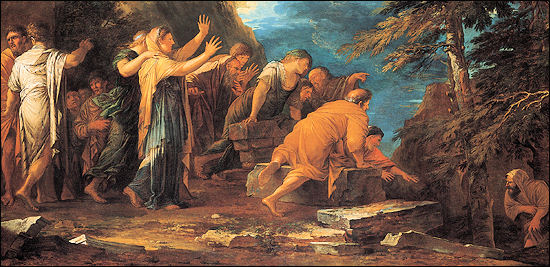
Pythagoras Emerging from the Underworld by Salvator Rosa
Image Sources: Wikimedia Commons, The Louvre, The British Museum
Last updated September 2024
